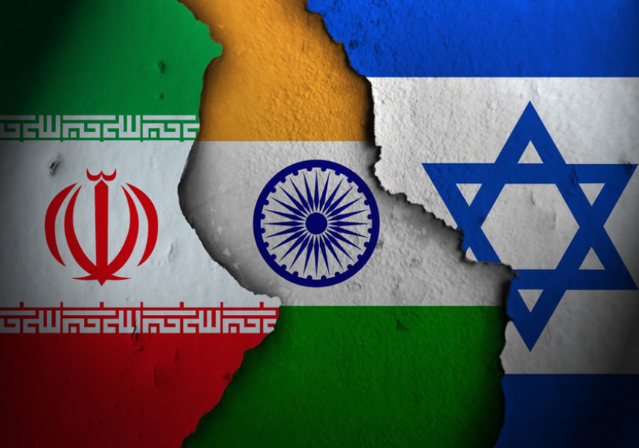Middle Path in the Middle East (GS Paper 2, IR)

Context
- The geopolitical landscape of the Middle East is marked by rising tensions, particularly between Iran and Israel.
- This situation poses significant challenges for India, which must carefully balance its relationships with these nations while nurturing its long-standing ties with the Arab world. India’s diplomatic approach is crucial not only for its national interests but also for regional stability.
India’s Strategic Dilemma
India’s strategic dilemma arises from its multifaceted relationships in the Middle East:
- Deep Ties with the Arab World: India has a rich historical and cultural connection with Arab nations, bolstered by significant economic ties. However, the ongoing conflict between Iran and Israel complicates this relationship.
- Iran’s Strategic Importance: Iran is geographically vital, sharing borders with Afghanistan and Pakistan. It also has significant hydrocarbon resources. However, its adversarial stance towards the West and its support for various militant groups pose challenges for India’s diplomatic balancing act.
- Growing Relations with Israel: Since normalizing relations in the 1990s, India has increasingly collaborated with Israel in defense, technology, and agriculture. Yet, Israel’s policies towards Palestinians and its military actions in recent conflicts have raised concerns among Arab states.
Importance of Ties with the Arab World
- Economic Significance: The Arab world, encompassing nearly 500 million people across 23 countries, presents vast opportunities for India in trade and investment. The region is a critical market for Indian goods and services.
- Energy Security: The Middle East is vital for India's energy security, supplying approximately 85% of its crude oil requirements. Any instability in the region can directly impact India’s energy imports, making these relationships crucial.
- Cultural Links: India shares deep-rooted historical and civilizational ties with the Arab nations, dating back to ancient trade routes. These connections continue to thrive through cultural exchanges, shared heritage, and the presence of a large Indian diaspora.
- Promotion of Moderate Islam: The Arab world’s promotion of moderate Islamic values can foster regional stability and counter extremist ideologies, which is beneficial not only for the region but also for India’s internal security.
Balancing Relations with Iran
India’s relationship with Iran is characterized by historical ties and shared interests, particularly in energy and regional stability:
- Geopolitical Significance: Iran serves as a critical link for India to Central Asia, providing access to trade routes and energy resources. This strategic importance is heightened by India’s efforts to engage with Central Asian countries.
- Complex Diplomatic Challenges: Despite its importance, India’s relationship with Iran is fraught with challenges, including Iran's support for proxy groups in the region, which can conflict with India’s interests, especially regarding its relationship with Israel and the Gulf states.
- Energy Collaboration: Iran's vast oil and gas reserves are crucial for India’s energy needs. However, sanctions and geopolitical tensions complicate this relationship, necessitating careful navigation by Indian policymakers.
Growing Ties with Israel
India's relationship with Israel has grown significantly, particularly under the Modi government, highlighting:
- Defense and Security Cooperation: Israel has become a key partner for India in defense procurement, technology transfer, and intelligence sharing, particularly concerning counter-terrorism initiatives.
- Political Implications: While enhancing ties with Israel, India faces the challenge of maintaining its relationships with Arab nations, which view Israeli policies towards Palestine with suspicion. This duality can create friction in India’s diplomatic relations.
- Regional Stability: Israel’s ongoing conflicts, particularly regarding Gaza, impact the broader geopolitical landscape, and India’s support for Palestinian statehood remains a sensitive issue in its relations with Arab countries.
Arab-Israeli Normalization and Iran's Influence
The geopolitical dynamics further complicate India’s position:
- Abraham Accords: The normalization agreements between Israel and several Arab states represent a significant shift. However, these accords have not led to meaningful advancements in Palestinian statehood, perpetuating tensions in the region.
- Iran's Role: Iran's support for militant groups and its adversarial relationship with Israel exacerbate regional tensions. Some Arab nations are exploring normalization with Iran, but this is complicated by Iran's involvement in sectarian conflicts.
India’s Role in Promoting Stability
India’s strategic interests are best served by fostering a peaceful and stable Middle East:
- Support for Diplomatic Efforts: India must engage actively in peace initiatives, promoting dialogue between Iran and Israel and advocating for Arab nations to find common ground.
- Economic Integration: A stable, economically integrated Middle East is vital for India’s interests, especially as it seeks to enhance trade routes and energy security.
- Humanitarian Engagement: India can also play a role in humanitarian efforts, providing assistance and support to conflict-affected populations, thus enhancing its soft power in the region.
Significance of the Middle East for India
- Energy Security: The region is crucial for India’s energy needs, making stable relations imperative for economic growth.
- Counter-Terrorism Cooperation: India collaborates with Middle Eastern nations on counter-terrorism efforts, addressing a significant threat to its national security.
- Diaspora Contributions: The Indian diaspora in the Middle East plays a vital role in the economy through remittances, further solidifying India’s ties with the region.
- Cultural Connections: Shared cultural heritage and exchanges enrich India’s relations with Arab countries, fostering goodwill and understanding.
- Global Influence: Engagement in the Middle East enhances India’s standing in international forums, allowing it to play a larger role in global governance and address pressing issues like climate change and security.
Conclusion
- Navigating the complexities of the Middle East requires India to adopt a nuanced and balanced approach.
- By strengthening ties with Arab nations while managing relationships with Iran and Israel, India can play a pivotal role in promoting peace and stability.
- A stable Middle East is not only essential for the region but also integral to India’s economic and strategic interests, reinforcing the need for a careful diplomatic strategy that prioritizes dialogue and cooperation.


